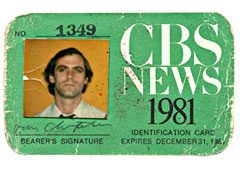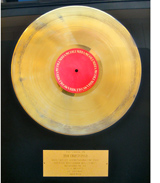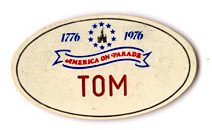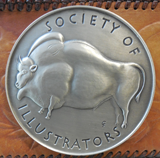Tom Christopher Biography
“Monet had his water lilies and Tom Christopher has Times Square.” — The New Yorker
Tom Christopher is a classically trained draughtsman. He received a BFA from the Art Center College of Design, Pasadena, California, studying with the legendary Disney animator Ward Kimball and the painter Lorser Fietelson. He then worked for Peterson Publishing drawing automobiles for Motor Trend Magazine, drawing portraits at Disneyland and creating rock posters for CBS Records.
After moving to New York in 1981 he went on drawing assignments with Meredith Vieira and John Stossel covering courtroom drama for CBS News in downtown Manhattan. This experience in part formed the foundation for a narrative and journalistic approach to his art.
Although born in Hollywood, and steeped in the LA hot rod / skateboard culture, he became obsessed with painting household objects and tools on a Brobdingnagian scale, exhibiting in galleries in the East Village. He would always carry a sketchbook, endlessly drawing and recording everything from subways to skyscrapers.
In 1987, NYC was a dark city, crime ridden and gripped by fear. But, as he put it: “One day walking around Times Square, the clouds cleared and I had an epiphany of sorts. The City exploded in a blaze of expressionistic colors with the brilliant laser white light sculpting the buildings, cabs, messengers and scurrying figures. At once I realized my mission; try and capture the narrative, the beauty and the magnetic pull of the epicenter of this modern urban city.”
Now his subject matter is largely focused on the streets of New York. But calling him a New York painter would be as much a mistake as it would be to dismiss Kirchner as a Berlin cityscene painter. They have both used the subject of the city as a launching pad to explore the many aspects of man’s struggle in an urban environment. Indeed, this theme is universal as his paintings have found a following in Europe, especially Paris, Germany and Tokyo.
Most of the work is painted using small batch, handmade acrylic paint. Pencil lines from the initial exploratory sketch stage often remain on the white canvass. These raw areas give the painting both breathing room and serve as a reminder of the process. His artistic vocabulary ranges from lines that loop and skit around, to delicate watercolor washes, heavy brushwork to thick impasto with swirls and drips of color.
Working with ‘at risk’ kids he brought these expressionistic colors and large brushwork to the Roseland Ballroom on 53rd St creating the city’s largest outdoor mural at 225 by 65 ft.
“I think it’s interesting to tell a story about people in the city and not necessarily be concerned about what the finished product will look like. The last thing an artist should do is to set out to try and make ‘art’. I find that if you have something to say, just paint, most of the time it will find it’s own way.” Says Mr. Christopher.
He was trained in an approach that relies on visual observation and blocking out all else. Actually, he was trained to not listen as it would become too distracting. This is now changing in new works with overheard conversations and fragments of speech finding their way into the artwork as titles of the paintings create a continually evolving narrative thread.
“Tom Christopher has become to American painting what Count Basie or Duke Ellington became to American popular music, not completely jazz but owning much to Charlie Parker and Charles Mingus.”
Dr. Louis Zona, Director and Chief Curator, The Butler Institute of American Art, Youngstown Ohio





